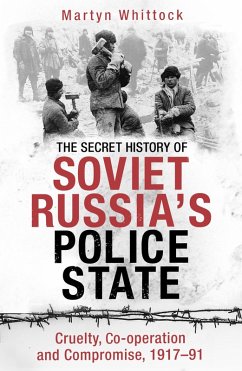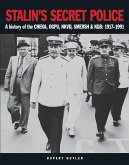'[R]eadable and thoughtful . . . does an excellent job of exploring how the murderous political police in all its incarnations defined the Soviet Union, and left a poisonous legacy still with us today'
Professor Mark Galeotti, author of The Vory and A Short History of Russia
Repression, control, manipulation and elimination of enemies assisted in the establishment of the Soviet state, and helped maintain it in power, but could not, in the end, prevent its collapse.
Citizens of the West have, for the most part, been told a very simplified story of the repressive 'totalitarian' state that was the USSR. In fact, it was sustained by more than just policing and force. No amount of revisionist history can erase the reality of millions controlled, imprisoned and killed, but there was much more to the USSR's one-party state than this. Whittock tells a more complex story of the combination of cruelty, co-operation and compromise required to build and run a one-party state. Much of this is the story of the role played by the secret police in creating and sustaining such a form of government, but it is much more than simply a 'history of the secret police'. This is because the 'police state' which emerged (in which dissent, both real and imaginary, was undoubtedly policed, threatened and ruthlessly eliminated) was more than just the product of the arrests, interrogations, executions and imprisonments carried out by the secret police. The USSR was also made possible by a battle for hearts and minds which led millions of people to feel that they really had benefited from the system and had a stake in the new society.
Professor Mark Galeotti, author of The Vory and A Short History of Russia
Repression, control, manipulation and elimination of enemies assisted in the establishment of the Soviet state, and helped maintain it in power, but could not, in the end, prevent its collapse.
Citizens of the West have, for the most part, been told a very simplified story of the repressive 'totalitarian' state that was the USSR. In fact, it was sustained by more than just policing and force. No amount of revisionist history can erase the reality of millions controlled, imprisoned and killed, but there was much more to the USSR's one-party state than this. Whittock tells a more complex story of the combination of cruelty, co-operation and compromise required to build and run a one-party state. Much of this is the story of the role played by the secret police in creating and sustaining such a form of government, but it is much more than simply a 'history of the secret police'. This is because the 'police state' which emerged (in which dissent, both real and imaginary, was undoubtedly policed, threatened and ruthlessly eliminated) was more than just the product of the arrests, interrogations, executions and imprisonments carried out by the secret police. The USSR was also made possible by a battle for hearts and minds which led millions of people to feel that they really had benefited from the system and had a stake in the new society.
Dieser Download kann aus rechtlichen Gründen nur mit Rechnungsadresse in A, B, BG, CY, CZ, D, DK, EW, E, FIN, F, GR, HR, H, IRL, I, LT, L, LR, M, NL, PL, P, R, S, SLO, SK ausgeliefert werden.









